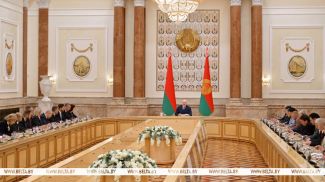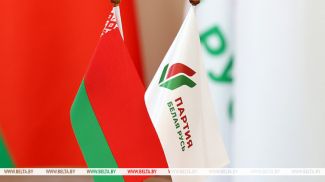
In 2005, the world-famous Neman Glassworks was deeply in the red and struggling to stay afloat. In this episode we will tell you how the state helped the factory to get back on its feet. How was a Neman glass piece confused with a Bohemian item? What Belarusian crystal and glassware are popular in Mongolia and China?
History of Neman Glassworks
Beryozovka became the land of glassmakers back in 1883. A small factory of the landowner Zenon Lensky made glass bottles. The owner offered jobs to the chief engineer of the Dyatkovo Crystal Factory Wilhelm Krajewski and the artist Julius Stolle. They made local products famous not only in the Russian Empire but also in Western Europe.
The company survived wars and crises. But in the 2000s, it went belly up. For the modernization alone, Neman Glassworks asked $10 million. All in all, the way out of the crisis was estimated at $20 million. More so, the factory was badly hurt by employee theft estimated as high as 30-35% of the annual output.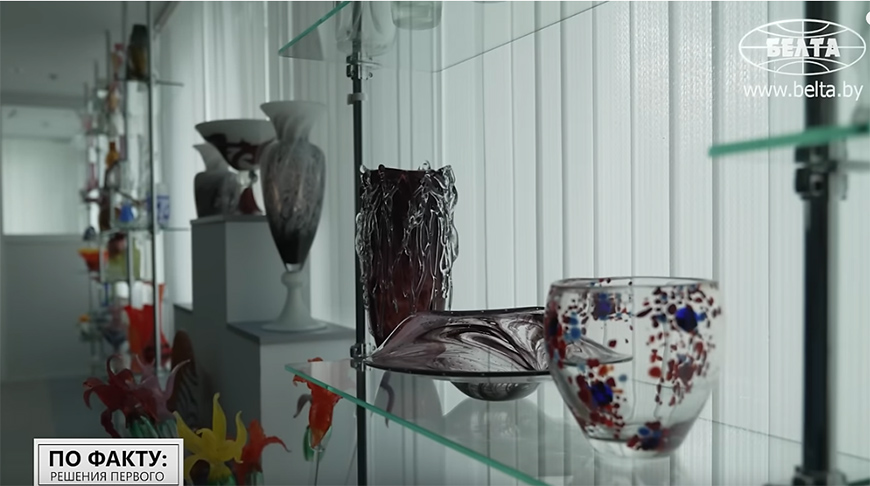
“Introduce iron discipline from 1 August! In my name! Decide who you're going to work with. Introduce identification badges that employees will swipe as they enter and leave the factory. Pay the money that employees earn. You'll get the money for the equipment. Work 24/7 until you get to the level where I can see that you are making progress. If I see the progress, I will help you again. But you can't get a kopeck just for a thank you. This is people's money. I can't take money and throw it away,” the head of state said as he visited the factory in July 2005.
What are modern Beryozovka craftsmen capable of?
Aleksandr Lukashenko agreed to help, albeit under tough conditions. But only after he saw what the local masters were capable of. They were capable of a lot, indeed.
“The president examined everything. At an exhibition, I briefed the president on the process of creating new products: from an idea in the head to a finished product. I think he liked it. Because at other exhibitions which he attended he asked for that bearded scientist he talked to at Neman... But, unfortunately, I didn't get to attend all the exhibitions. Well, that's how it was,” said Vasily Samokhvalov, chief artist at Neman Glassworks.
Despite the seriousness of the issues discussed, there was also a curious situation.
“At the exhibition we displayed a fairly new thing, which, by the way, we called "Presidential Set": shot glasses, drinking and wine glasses. In particular, at the request of the President Administration, we made sets with a monogram with the coat of arms. I don't know which of the government officials was in charge of the visit, but the set was presented to the president as Bohemian glass. I had to intervene and tell Aleksandr Grigorievich that it was our product and that we are not inferior to Bohemian glassmakers,” Vasily Samokhvalov noted.
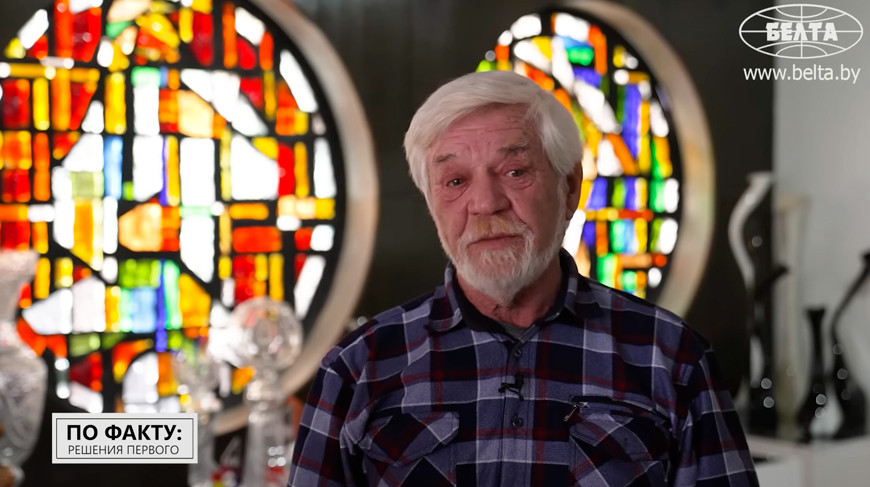
Why did the state want to save Neman Glassworks?
For almost all of its history, Neman Glassworks has been a local mainstay. In 2005, it employed two thirds of the town population. To lose such a plant meant to leave several thousand people without jobs. The state could not do this to people.
“It was decided to carry out a large-scale investment modernization program. A new line to produce glass wool was installed. This made it possible to replace certain imports,” said Sergei Lapitsky, director of Neman Glassworks.
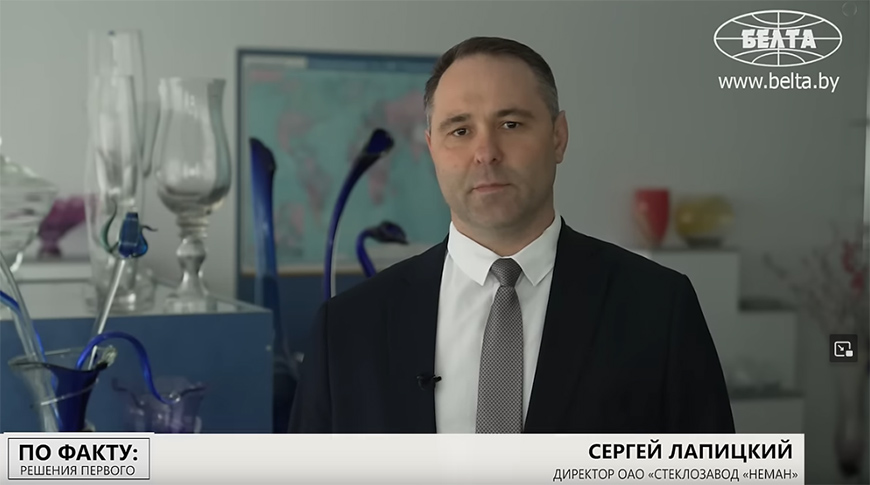
“Production of glass wool turned out to be a promising business,” he informed. “Production of glass wool was launched in April 2015. The estimated production capacity is 50 tonnes of glass wool per day. Today, we produce about 1,200 tonnes of glass wool per month. 05.03 The main consumers are the countries of Western Europe.
How did the coronavirus pandemic affect the glass factory?
Aleksandr Lukashenko visited the factory in April 2020. It was a time of the coronavirus pandemic. Every state decided on its own pandemic response strategy. Many enterprises in Europe were shut down for quarantine. Meanwhile Belarus did not have a lockdown.
“It was a difficult period. It is worth noting that the factory did not stop for a single day. The atmosphere was calm. Everyone was understanding of the situation. And most importantly, the opinion was unanimous: the factory should not halt the production,” Sergei Lapitsky stressed.
The president got acquainted in detail with the work of the glass factory. He evaluated both the organization of the manufacturing process and the finished products. In 2005, Aleksandr Lukashenko promised to help the enterprise if he saw that the plant was yielding results. No sooner said than done.
“As for your debts, I will consider a draft decree about them. It's on my desk. We will consider grace period extension options to give you more time to pay off your debts. You know, the government has obligations before doctors and teachers. Everyone must be paid and medicines need to be bought. All this is financed from the budget. For us to postpone your obligations long-term we need to find other sources to compensate for the money we extend to you. Therefore, we will support you in this regard. But keep in mind that you have to gain momentum. The demand is there, both for crystal, for glass, for glass wool. Now the economy in Europe is recovering. You have a good reputation. You make cool products. You have a niche for yourself which otherwise would have been occupied by others,” Aleksandr Lukashenko said as he talked to the factory workers in April 2020.
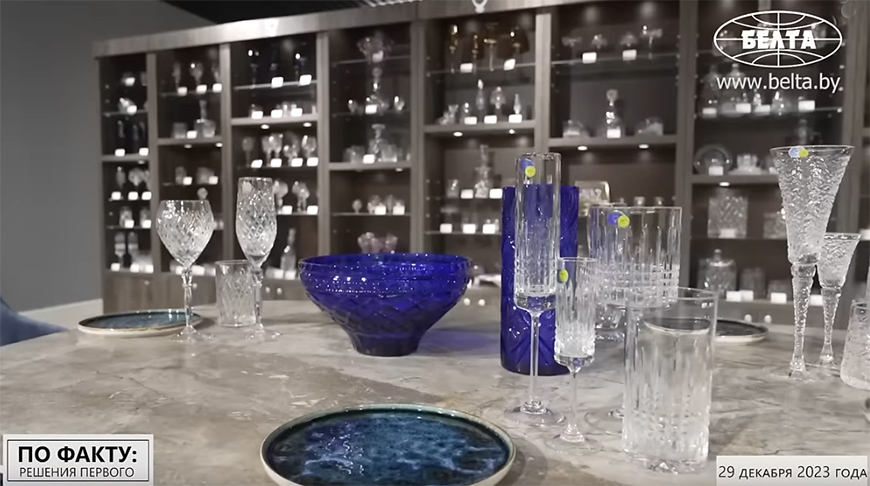
History of Neman Glassworks
Beryozovka became the land of glassmakers back in 1883. A small factory of the landowner Zenon Lensky made glass bottles. The owner offered jobs to the chief engineer of the Dyatkovo Crystal Factory Wilhelm Krajewski and the artist Julius Stolle. They made local products famous not only in the Russian Empire but also in Western Europe.
The company survived wars and crises. But in the 2000s, it went belly up. For the modernization alone, Neman Glassworks asked $10 million. All in all, the way out of the crisis was estimated at $20 million. More so, the factory was badly hurt by employee theft estimated as high as 30-35% of the annual output.

“Introduce iron discipline from 1 August! In my name! Decide who you're going to work with. Introduce identification badges that employees will swipe as they enter and leave the factory. Pay the money that employees earn. You'll get the money for the equipment. Work 24/7 until you get to the level where I can see that you are making progress. If I see the progress, I will help you again. But you can't get a kopeck just for a thank you. This is people's money. I can't take money and throw it away,” the head of state said as he visited the factory in July 2005.
What are modern Beryozovka craftsmen capable of?
Aleksandr Lukashenko agreed to help, albeit under tough conditions. But only after he saw what the local masters were capable of. They were capable of a lot, indeed.
“The president examined everything. At an exhibition, I briefed the president on the process of creating new products: from an idea in the head to a finished product. I think he liked it. Because at other exhibitions which he attended he asked for that bearded scientist he talked to at Neman... But, unfortunately, I didn't get to attend all the exhibitions. Well, that's how it was,” said Vasily Samokhvalov, chief artist at Neman Glassworks.
Despite the seriousness of the issues discussed, there was also a curious situation.
“At the exhibition we displayed a fairly new thing, which, by the way, we called "Presidential Set": shot glasses, drinking and wine glasses. In particular, at the request of the President Administration, we made sets with a monogram with the coat of arms. I don't know which of the government officials was in charge of the visit, but the set was presented to the president as Bohemian glass. I had to intervene and tell Aleksandr Grigorievich that it was our product and that we are not inferior to Bohemian glassmakers,” Vasily Samokhvalov noted.

Why did the state want to save Neman Glassworks?
For almost all of its history, Neman Glassworks has been a local mainstay. In 2005, it employed two thirds of the town population. To lose such a plant meant to leave several thousand people without jobs. The state could not do this to people.
“It was decided to carry out a large-scale investment modernization program. A new line to produce glass wool was installed. This made it possible to replace certain imports,” said Sergei Lapitsky, director of Neman Glassworks.

“Production of glass wool turned out to be a promising business,” he informed. “Production of glass wool was launched in April 2015. The estimated production capacity is 50 tonnes of glass wool per day. Today, we produce about 1,200 tonnes of glass wool per month. 05.03 The main consumers are the countries of Western Europe.
How did the coronavirus pandemic affect the glass factory?
Aleksandr Lukashenko visited the factory in April 2020. It was a time of the coronavirus pandemic. Every state decided on its own pandemic response strategy. Many enterprises in Europe were shut down for quarantine. Meanwhile Belarus did not have a lockdown.
“It was a difficult period. It is worth noting that the factory did not stop for a single day. The atmosphere was calm. Everyone was understanding of the situation. And most importantly, the opinion was unanimous: the factory should not halt the production,” Sergei Lapitsky stressed.
The president got acquainted in detail with the work of the glass factory. He evaluated both the organization of the manufacturing process and the finished products. In 2005, Aleksandr Lukashenko promised to help the enterprise if he saw that the plant was yielding results. No sooner said than done.
“As for your debts, I will consider a draft decree about them. It's on my desk. We will consider grace period extension options to give you more time to pay off your debts. You know, the government has obligations before doctors and teachers. Everyone must be paid and medicines need to be bought. All this is financed from the budget. For us to postpone your obligations long-term we need to find other sources to compensate for the money we extend to you. Therefore, we will support you in this regard. But keep in mind that you have to gain momentum. The demand is there, both for crystal, for glass, for glass wool. Now the economy in Europe is recovering. You have a good reputation. You make cool products. You have a niche for yourself which otherwise would have been occupied by others,” Aleksandr Lukashenko said as he talked to the factory workers in April 2020.
“A presidential decree was immediately adopted. This decree provided for the restructuring of debts to the national budget and banks and exemption from real estate tax and the transfer of non-core assets into municipal ownership. It was the decision of the head of state that made it possible to preserve the unique production of crystal, the team, jobs, and most importantly, traditions and centuries-old experience,” Sergei Lapitsky said.

What matters most for such a unique production?
The decision was made to provide state support to the enterprise and to scale up its production. Speaking to the enterprise’s personnel, the president emphasized that glass wool was in demand both in Belarus and abroad.
“You are doing great. You have prospects. I saw your glass wool products. 00.22 The main thing is that this glass wool is very popular in the market. There is a huge demand for it. That is why I made a decision to get another workshop built here. We will find necessary resources for that. The most important thing is that the products you make are in demand both on the domestic market and abroad,” the Belarusian leader said as he visited Neman Glassworks in April 2020.
The factory managed to keep its team together during the hard times. Specialists matter most for such a unique production facility. It is easy to lose traditions, but it takes a lot of time and money to train people in such rare professions.
“My grandfather and my father worked here. The interest in glassblowing is passed in our family from generation to generation. The glass itself attracts me. The ability to mold something out of glass is astonishing.21.08 Glass can be molded, stretched, blown. A lot of beautiful things can be made of glass,” Vadim Bartashevich, 7th grade glassblower, said.

Manufacturing process at Neman Glassworks
Let us be true, the job is not for everyone. It is hard and patient work. Molten glass temperatures reach 1,400°C. The glass product is annealed at 560°C. This job is not for those who are used to working in an air-conditioned office. There are many other nuances in this profession.
“Molten glass is very hot. It is difficult to hold it on the blowpipe. It is hard to catch the moment to decide on the shape of the parison. There are certain difficulties with blowing a set of shot glasses. This work has its specifics,” Vadim Bartashevich said.
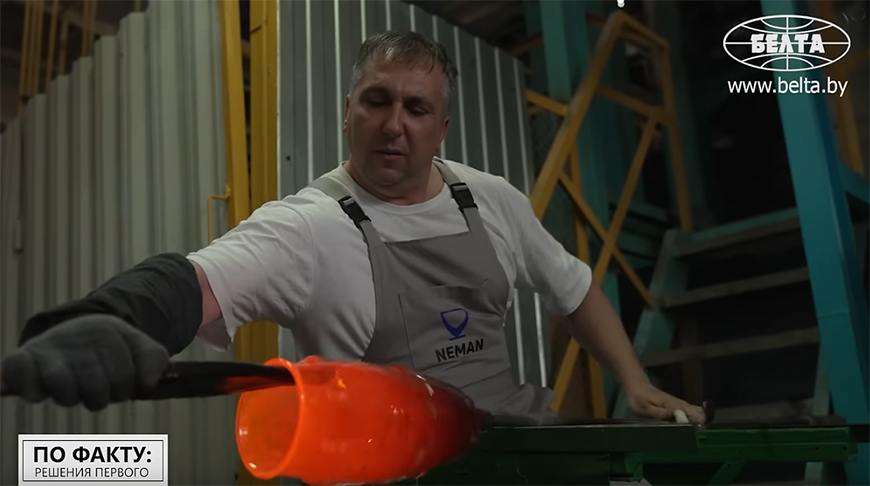
“The enterprise has developed its own system of personnel training. A new employee is assigned to a highly qualified specialist who teaches the young specialist the profession.08.28 With this systemic approach in mind the enterprise renewed the tradition of training specialists in educational institutions in 2023.Today young specialists from Lida Polytechnic College are undergoing training courses at our enterprise.08.55 It is highly satisfying to see how our honored workers pass on their experience to the younger generation,” Sergei Lapitsky said.
No two products are the same. First of all, it is impossible to weigh molten glass. Secondly, it is impossible to measure the specialist’s blowing strength. It turns out that each vase is unique. Meanwhile, the glass making mechanism is universal and has been established over decades.
“The components - sand, soda ash and the rest – are mixed up. The mixture is brought here to the furnace, and poured in. Molten glass is formed at high temperatures. Then our specialists and I dipa blowpipe into molten glass, make a small parison, form it depending on the size of the product. For a big product, we dip the blowpipe into molten glass several times,make the mold and get the product. When the product is formed, it is placed in a furnace for annealing to secure the glass from cracking,” Vadim Bartashevich said.
Out of the furnace, glasses and vases are placed on a special belt to cool down. Large items need about four hours, while smaller ones - one and a half hours. Soft warm shears wrapped with asbestos tape are used to carry products. Thermal stress may lead to cracking.

Where are Neman Glassworks products most popular?
Every month, the enterprise processes 1,200tonnes of raw materials. These include sand, dolomite powder, urea, limestone, and chalk. All the supplies come from Belarusian enterprises. If the enterprise lacks something, Russia lends a helping hand. This makes the enterprise independent from the economic pressure of Western countries.
“The enterprise exports annually about 70% of glass and crystal products worth over $6 million. The main sales market is the Russian Federation. Annually we ship to our Russian partners about 30% of the output worth over $4.5 million,” said Diana Tarashkevich, Head of the Glassware Sales Department of the Managing Company of the Belarusian Glass Company Holding Company.
Apart from Russia, Neman Glassworks sells its glass and crystal products to Uzbekistan, Moldova, Kyrgyzstan, the USA and China. The sales to Kazakhstan tripled last year. The supplies continue to grow this year.
“Our major new market is Mongolia. We sell classic products there, such as stemware, shot glasses, wine glasses, and tumblers. 14.00 Our products feature fine designs and our signature golden patterns. We cooperate with electronic trading platforms, such as Wildberries and Ozon (the Russian Federation), Amazon (England, France, Italy, Spain) as part of additional measures to promote Belarusian products abroad. 14/32 Serving bowls are most popular delivery items to China. These are bowls to serve candies, cookies, ice cream,” Diana Tarashkevich said.

To find its customer, the product must be of high quality and meet the current fashion trends. Neman keeps a close eye on this through international exhibitions and market research. The factory has twelve chain stores, including one in the First National Trading House.

What matters most for such a unique production?
The decision was made to provide state support to the enterprise and to scale up its production. Speaking to the enterprise’s personnel, the president emphasized that glass wool was in demand both in Belarus and abroad.
“You are doing great. You have prospects. I saw your glass wool products. 00.22 The main thing is that this glass wool is very popular in the market. There is a huge demand for it. That is why I made a decision to get another workshop built here. We will find necessary resources for that. The most important thing is that the products you make are in demand both on the domestic market and abroad,” the Belarusian leader said as he visited Neman Glassworks in April 2020.
The factory managed to keep its team together during the hard times. Specialists matter most for such a unique production facility. It is easy to lose traditions, but it takes a lot of time and money to train people in such rare professions.
“My grandfather and my father worked here. The interest in glassblowing is passed in our family from generation to generation. The glass itself attracts me. The ability to mold something out of glass is astonishing.21.08 Glass can be molded, stretched, blown. A lot of beautiful things can be made of glass,” Vadim Bartashevich, 7th grade glassblower, said.

Manufacturing process at Neman Glassworks
Let us be true, the job is not for everyone. It is hard and patient work. Molten glass temperatures reach 1,400°C. The glass product is annealed at 560°C. This job is not for those who are used to working in an air-conditioned office. There are many other nuances in this profession.
“Molten glass is very hot. It is difficult to hold it on the blowpipe. It is hard to catch the moment to decide on the shape of the parison. There are certain difficulties with blowing a set of shot glasses. This work has its specifics,” Vadim Bartashevich said.

“The enterprise has developed its own system of personnel training. A new employee is assigned to a highly qualified specialist who teaches the young specialist the profession.08.28 With this systemic approach in mind the enterprise renewed the tradition of training specialists in educational institutions in 2023.Today young specialists from Lida Polytechnic College are undergoing training courses at our enterprise.08.55 It is highly satisfying to see how our honored workers pass on their experience to the younger generation,” Sergei Lapitsky said.
No two products are the same. First of all, it is impossible to weigh molten glass. Secondly, it is impossible to measure the specialist’s blowing strength. It turns out that each vase is unique. Meanwhile, the glass making mechanism is universal and has been established over decades.
“The components - sand, soda ash and the rest – are mixed up. The mixture is brought here to the furnace, and poured in. Molten glass is formed at high temperatures. Then our specialists and I dipa blowpipe into molten glass, make a small parison, form it depending on the size of the product. For a big product, we dip the blowpipe into molten glass several times,make the mold and get the product. When the product is formed, it is placed in a furnace for annealing to secure the glass from cracking,” Vadim Bartashevich said.
Out of the furnace, glasses and vases are placed on a special belt to cool down. Large items need about four hours, while smaller ones - one and a half hours. Soft warm shears wrapped with asbestos tape are used to carry products. Thermal stress may lead to cracking.

Where are Neman Glassworks products most popular?
Every month, the enterprise processes 1,200tonnes of raw materials. These include sand, dolomite powder, urea, limestone, and chalk. All the supplies come from Belarusian enterprises. If the enterprise lacks something, Russia lends a helping hand. This makes the enterprise independent from the economic pressure of Western countries.
“The enterprise exports annually about 70% of glass and crystal products worth over $6 million. The main sales market is the Russian Federation. Annually we ship to our Russian partners about 30% of the output worth over $4.5 million,” said Diana Tarashkevich, Head of the Glassware Sales Department of the Managing Company of the Belarusian Glass Company Holding Company.
Apart from Russia, Neman Glassworks sells its glass and crystal products to Uzbekistan, Moldova, Kyrgyzstan, the USA and China. The sales to Kazakhstan tripled last year. The supplies continue to grow this year.
“Our major new market is Mongolia. We sell classic products there, such as stemware, shot glasses, wine glasses, and tumblers. 14.00 Our products feature fine designs and our signature golden patterns. We cooperate with electronic trading platforms, such as Wildberries and Ozon (the Russian Federation), Amazon (England, France, Italy, Spain) as part of additional measures to promote Belarusian products abroad. 14/32 Serving bowls are most popular delivery items to China. These are bowls to serve candies, cookies, ice cream,” Diana Tarashkevich said.

To find its customer, the product must be of high quality and meet the current fashion trends. Neman keeps a close eye on this through international exhibitions and market research. The factory has twelve chain stores, including one in the First National Trading House.







